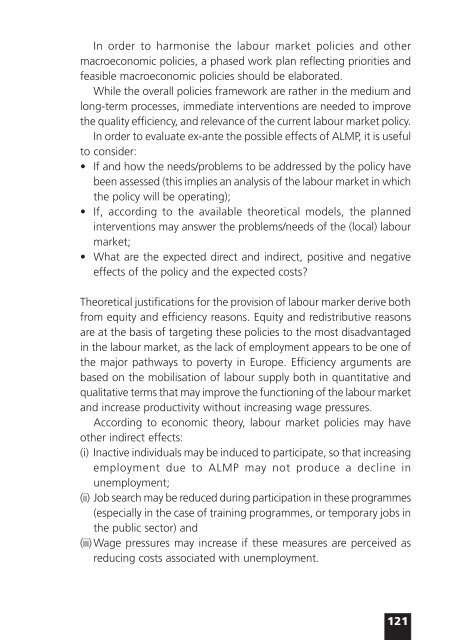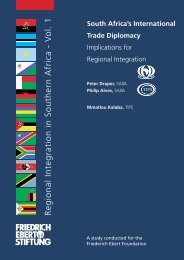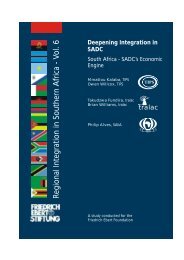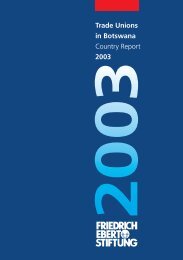Deepening Integration in SADC - Fes-botswana.org
Deepening Integration in SADC - Fes-botswana.org
Deepening Integration in SADC - Fes-botswana.org
You also want an ePaper? Increase the reach of your titles
YUMPU automatically turns print PDFs into web optimized ePapers that Google loves.
In order to harmonise the labour market policies and other<br />
macroeconomic policies, a phased work plan reflect<strong>in</strong>g priorities and<br />
feasible macroeconomic policies should be elaborated.<br />
While the overall policies framework are rather <strong>in</strong> the medium and<br />
long-term processes, immediate <strong>in</strong>terventions are needed to improve<br />
the quality efficiency, and relevance of the current labour market policy.<br />
In order to evaluate ex-ante the possible effects of ALMP, it is useful<br />
to consider:<br />
If and how the needs/problems to be addressed by the policy have<br />
been assessed (this implies an analysis of the labour market <strong>in</strong> which<br />
the policy will be operat<strong>in</strong>g);<br />
If, accord<strong>in</strong>g to the available theoretical models, the planned<br />
<strong>in</strong>terventions may answer the problems/needs of the (local) labour<br />
market;<br />
What are the expected direct and <strong>in</strong>direct, positive and negative<br />
effects of the policy and the expected costs?<br />
Theoretical justifications for the provision of labour marker derive both<br />
from equity and efficiency reasons. Equity and redistributive reasons<br />
are at the basis of target<strong>in</strong>g these policies to the most disadvantaged<br />
<strong>in</strong> the labour market, as the lack of employment appears to be one of<br />
the major pathways to poverty <strong>in</strong> Europe. Efficiency arguments are<br />
based on the mobilisation of labour supply both <strong>in</strong> quantitative and<br />
qualitative terms that may improve the function<strong>in</strong>g of the labour market<br />
and <strong>in</strong>crease productivity without <strong>in</strong>creas<strong>in</strong>g wage pressures.<br />
Accord<strong>in</strong>g to economic theory, labour market policies may have<br />
other <strong>in</strong>direct effects:<br />
(i) Inactive <strong>in</strong>dividuals may be <strong>in</strong>duced to participate, so that <strong>in</strong>creas<strong>in</strong>g<br />
employment due to ALMP may not produce a decl<strong>in</strong>e <strong>in</strong><br />
unemployment;<br />
(ii) Job search may be reduced dur<strong>in</strong>g participation <strong>in</strong> these programmes<br />
(especially <strong>in</strong> the case of tra<strong>in</strong><strong>in</strong>g programmes, or temporary jobs <strong>in</strong><br />
the public sector) and<br />
(iii) Wage pressures may <strong>in</strong>crease if these measures are perceived as<br />
reduc<strong>in</strong>g costs associated with unemployment.<br />
121








